|
|
|
Sort Order |
|
|
|
Items / Page
|
|
|
|
|
|
|
| Srl | Item |
| 1 |
ID:
158725
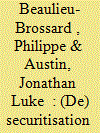

|
|
|
|
|
| Summary/Abstract |
This article theorises the simultaneous enaction of securitising and desecuritising moves. It argues that the frequent simultaneity of these two processes, which are normally considered mutually exclusive within Securitisation Theory (ST), has previously gone unnoticed given a set of methodological, temporal, and ontological biases that have developed within ST. Demonstrating how these biases can be overcome – and even reconciled with the seminal texts of ST – by drawing on work from within social theory and elsewhere, we argue that the frequent simultaneity of (de)securitising moves most urgently requires us to reconsider the normative status of desecuritisation within ST. Although desecuritisation has traditionally been viewed as normatively positive, we argue that its temporally immanent enaction alongside securitising moves might introduce more violence into security politics and, in fact, exacerbate protracted conflicts. Ultimately, we make the normative ambitions of some within ST more opaque. Desecuritisation is not a shortcut to the ethical-political good within ST.
|
|
|
|
|
|
|
|
|
|
|
|
|
|
|
|
| 2 |
ID:
149483
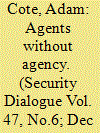

|
|
|
|
|
| Summary/Abstract |
This article assesses the role of the audience in securitization theory. The main argument is that in order to accurately capture the role of the securitization audience, it must be theorized as an active agent, capable of having a meaningful effect on the intersubjective construction of security values. Through a meta-synthesis of 32 empirical studies of securitization, this article focuses on two central questions: (1) Who is the audience? (2) How does the audience engage in the construction of security? When assessed against the theoretical works on securitization, this analysis reveals that the manner in which the audience is defined and characterized within securitization theory differs with the empirical literature that investigates securitization processes. Where the empirical literature suggests securitization is a highly intersubjective process involving active audiences, securitization theory characterizes audiences as agents without agency, thereby marginalizing the theory’s intersubjective nature. This article sketches a new characterization of the securitization audience and outlines a framework for securitizing actor–audience interaction that better accounts for securitization theory’s linguistic and intersubjective character, addresses this theoretical/empirical conflict, and improves our understanding of how groups select and justify security priorities and costly security policies.
|
|
|
|
|
|
|
|
|
|
|
|
|
|
|
|
| 3 |
ID:
085722
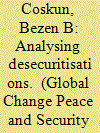

|
|
|
|
|
| Publication |
2008.
|
| Summary/Abstract |
Securitisation theory, which has been developed by a number of scholars affiliated to the Copenhagen Peace Research Institute, has become one of the most attractive analytical tools in contemporary critical security studies. The work of Barry Buzan, Ole waever and others has made a major contribution to our understanding of the dynamics of security by introducing the concepts of 'securitisation' and 'desecuritisation'. However, while this approach has made a major theoretical contribution in general, there have been few attempts at applying the concept of desecuritisation in particular. Moreover, at the theoretical level, there are also problems, notably an under-theorisation of the desecuritisation. This article is an attempt to apply the under-employed/under-theorised concept of desecuritisation to the Israeli-Palestinian case with a particular focus on the potential for desecuritisation arising from Israeli-Palestinian cooperation/coexistence efforts. Based on a conceptual framework that integrates desecuritisation with the concepts of peace-building and peace-making, the article pays attention to peace education efforts involving Israeli and Palestinian civil societies as desecuritisation initiatives.
|
|
|
|
|
|
|
|
|
|
|
|
|
|
|
|
| 4 |
ID:
187503
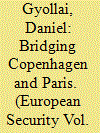

|
|
|
|
|
| Summary/Abstract |
Integrating the discursive and practice-based approach to securitisation, this article explores how the police function as the audience of securitising discourse. Taking the Hungarian case of border control, it looks into how the police accept and buy into anti-immigrant discourses of the political elite. Based on a questionnaire survey of Hungarian police officers, it demonstrates the potential of discursive legitimation in shaping officers’ understanding of mass migration. It describes the ways in which attitudes and hence, arguably, practice can be conditioned by securitising discourse. The overall aim of the article is to advance the understanding of the narrative dimension of power struggles between police and the political elite, and how that structures the field of border security. Critical security scholars have pointed out that police filter securitising discourse based on their professional dispositions and preferences. However, the Hungarian case seems to suggest that discourse may, in fact, influence dispositions themselves.
|
|
|
|
|
|
|
|
|
|
|
|
|
|
|
|
| 5 |
ID:
109594
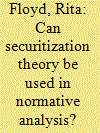

|
|
|
|
|
| Publication |
2011.
|
| Summary/Abstract |
While securitization studies have paid considerable attention to the moral value of desecuritization, they have paid almost no attention to the morality of securitization. In this article, I attempt to rectify that situation by proposing a revision of securitization theory that specifies three criteria that - if fulfilled at the same time - would render a securitization morally right. The criteria are: (1) that there is an objective existential threat; (2) that the referent object of security is morally legitimate; and (3) that the security response is appropriate to the threat in question. Although what is suggested here is considerably removed from the Copenhagen School's original securitization theory, it is akin to that framework insofar as it retains the functional distinction between the security analyst and the securitizing actor. Indeed, the development of criteria that determine the moral rightness of securitization is analogous to the Copenhagen School's devising criteria that determine both the existence and the success of securitization.
|
|
|
|
|
|
|
|
|
|
|
|
|
|
|
|
| 6 |
ID:
169202
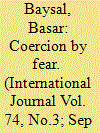

|
|
|
|
|
| Summary/Abstract |
The Iraq War was one of the most prominent events of the early 2000s. The prelude to the war halted the sense of optimism that captivated International Relations as a discipline after the end of the Cold War. The United States initiated this war following a lengthy securitization process. This study focuses on analyzing the securitization process in Iraq prior to the 2003 war. To that end, the article investigates the securitization process by asking, “How, within what context, and when did the securitization of Iraq take place?” For the study, 85 speeches made by President Bush are analyzed to examine how the president presented Iraq as an existential threat. The study also examines the kinds of arguments used by the Bush administration in securitizing Iraq. This study contributes to the literature on the 2003 Iraq War and security studies by applying Securitization Theory to the Iraq case by incorporating two essential contributions to the securitization analysis: context and audience(s).
|
|
|
|
|
|
|
|
|
|
|
|
|
|
|
|
| 7 |
ID:
109586
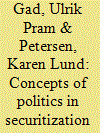

|
|
|
|
|
| Publication |
2011.
|
| Summary/Abstract |
The article argues that there are a number of concepts of politics in play in the current debates on securitization theory and that greater awareness regarding these conceptual differences helps clarify not only theoretical differences but also the possibilities for new theoretical development and reflection. The article identifies three conversations on politics: first, a conversation on how politics concerns action and intentionality; second, a conversation on the modern organization of politics, spheres and sectors; and, third, a conversation on the relationship between politics, ethics and science. Where the first and third conversations refer to politics as an act, in the second conversation politics is inherently tied to the institutional or spatial structures of government - the state, the public, the political field, spheres, sectors or function.
|
|
|
|
|
|
|
|
|
|
|
|
|
|
|
|
| 8 |
ID:
171771
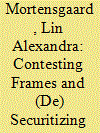

|
|
|
|
|
| Summary/Abstract |
This article bridges the Copenhagen school's (CS) framework and framing theory. Framing theory focuses on how a text frames its topic and is often applied to media sources. This is important because the media often is our sole source of learning about events and issues in the world. This article argues that bridging the CS framework and framing theory allow us to understand how the media conveys these issues and with what consequences. Through the bridging, the article makes two contributions to the existing debates on securitization. First, it introduces the concept of a (de)securitizing schema as an innovative way to analyze the media as a (de)securitizing actor. Second, the article uses the concept of a (de)securitizing schema to understand how contesting frames exist in the media. Empirically, the article analyzes two Danish case studies surrounding the migration movements on the European Union's southern border by undertaking a discourse analysis of four Danish newspapers. This empirical analysis shows how the media can be a securitizing actor, capable of employing multiple contesting frames—sometimes within a single news item. In addition, the Danish case illustrates how securitizing and desecuritizing frames evolve over time and from one case study to the next. The article concludes by reflecting on what the concept of securitizing schemas and contesting frames may imply for securitization studies and other case studies.
|
|
|
|
|
|
|
|
|
|
|
|
|
|
|
|
| 9 |
ID:
077204
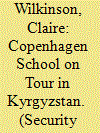

|
|
|
|
|
| Publication |
2007.
|
| Summary/Abstract |
The article argues that the theoretical framework presented by the Copenhagen School is currently unsuited to empirical studies outside the West owing to two factors. First, the presence of the 'Westphalian straitjacket' has prevented explicit interrogation of the normative concepts underlying the framework: there is a presumption that European understandings of society and the state are universal. Second, the centrality of the speech-act for securitization to the exclusion of other forms of expression, such as physical action, results in the theoretical framework producing a Westernized description of a given situation. The extent to which these factors limit the utility of the concepts of securitization and societal security in a non-Western setting is illustrated through the case of the overthrow of the government in Kyrgyzstan in March 2005. This example forms an empirical critique to highlight how theoretical shortcomings result in a simplified and Westernized description of the situation that does not take into account the specific local socio-political context. The article concludes that if the Copenhagen School's theoretical framework is to be considered suitable for universal application, future theoretical developments must explicitly address the issues discussed to enable progress in escaping International Relations' Westphalian straitjacket
|
|
|
|
|
|
|
|
|
|
|
|
|
|
|
|
| 10 |
ID:
124780
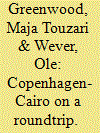

|
|
|
|
|
| Publication |
2013.
|
| Summary/Abstract |
Although securitization theory has been applied worldwide, it has been accused of having only limited appositeness to the non-Western world. When the Centre for Advanced Security Theory began a collaboration with the Danish-Egyptian Dialogue Institute and the Al-Ahram Centre for Political and Strategic Studies in Cairo in 2010, securitization theory was challenged on two levels: both through its employment to analyse and act politically in a Middle Eastern context, and through the attempt to do so during and after the Arab Spring, when the entire Egyptian security sector was being re-evaluated. These unique circumstances prompted reflections on the use of non-traditional and traditional security concepts, on how the Egyptian revolution could be understood through securitization theory, and on what the experiences of this project might mean for further theory development. This article discusses these points in the light of the Danish delegation's experiences.
|
|
|
|
|
|
|
|
|
|
|
|
|
|
|
|
| 11 |
ID:
109595
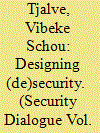

|
|
|
|
|
| Publication |
2011.
|
| Summary/Abstract |
This article pursues three interrelated objectives. Above all, it seeks to theorize desecuritization at the level of polity rather than policy; to distinguish between forms of political order and the likelihood that they will give in to the call for exceptional measures. Second, and to achieve that goal, it suggests a turn away from continental notions of 'the people' and towards American debates over 'the public sphere': a realm deliberately designed and continually cultivated to exercise autonomous, pluralistic and politicized contestation. Third, it examines why the 'speechlessness' of contemporary Western security practices may inhibit that public sphere from functioning properly.
|
|
|
|
|
|
|
|
|
|
|
|
|
|
|
|
| 12 |
ID:
092347
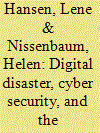

|
|
|
|
|
| Publication |
2009.
|
| Summary/Abstract |
This article is devoted to an analysis of cyber security, a concept that arrived on the post-Cold War agenda in response to a mixture of technological innovations and changing geopolitical conditions. Adopting the framework of securitization theory, the article theorizes cyber security as a distinct sector with a particular constellation of threats and referent objects. It is held that "network security" and "individual security" are significant referent objects, but that their political importance arises from connections to the collective referent objects of "the state,""society,""the nation," and "the economy." These referent objects are articulated as threatened through three distinct forms of securitizations: hypersecuritization, everyday security practices, and technifications. The applicability of the theoretical framework is then shown through a case-study of what has been labeled the first war in cyber space against Estonian public and commercial institutions in 2007.
|
|
|
|
|
|
|
|
|
|
|
|
|
|
|
|
| 13 |
ID:
166747
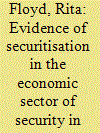

|
|
|
|
|
| Summary/Abstract |
Although the Copenhagen school’s securitisation theory and their sectoral analysis are integral parts of European security studies, the school’s economic sector of security has almost been completely ignored. In this article I examine why this is, and whether it makes sense to retain this sector. In the process I flesh out the logic of securitisation in the economic sector. I suggest that one reason why the economic sector of security has been neglected is that real life examples fitting the Copenhagen school’s logic of security as the exception have – in this sector – remained outstanding. Research in other sectors of security has shown however that securitisation does not need to include extraordinary countermeasures; instead it can play out below the level of the exception. Using alternative formulations developed in securitisation studies that relax the threshold for the success of securitisation, I attempt to locate evidence of economic securitisation by looking at two empirical cases. 1) Russia’s economic blackmail of Ukraine at the start of that country’s ongoing crisis. 2) The EU’s conditional bailout of Cyprus during the Eurozone crisis which necessitated capital controls. On the basis of the empirical evidence gathered I conclude by arguing the case for the economic sector of security.
|
|
|
|
|
|
|
|
|
|
|
|
|
|
|
|
| 14 |
ID:
172295
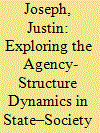

|
|
|
|
|
| Summary/Abstract |
Based on the data from the 13-month field visit spread over two trips (September 2016 to December 2016 and September 2017 to July 2018), this study highlights how securitisation efforts from the central government interact with environmental non-governmental organisation (ENGO) activism and advocacy in China, producing diverse outcomes across temporal and spatial dimensions. The trajectory of state–society relations in the context of environmental governance depends on (a) the ability of party-state to control ‘new media’ activism and manage ENGO advocacy to ‘maintain stability/rule by law’ and (b) ability of the assemblage of media activism and ENGO advocacy, along with other agents, to support the transition from ‘rule by law’ to ‘rule of law’. The overall findings are discussed in the context of the ‘Copenhagen School’ framework in International Relations Theory to examine the process of securitisation in the environmental sector in China. The securitising actor (the one who leads the process of securitisation such as States), referent object (the object under existential threat, i.e. human nature harmony) and functional actors (those who support or oppose the process of securitisation, i.e. ENGOs) are the major players involved.
|
|
|
|
|
|
|
|
|
|
|
|
|
|
|
|
| 15 |
ID:
135570
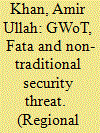

|
|
|
|
|
| Summary/Abstract |
The theoretical framework exploring security changed following the end of the cold war. In the post-cold war era, strategic thinkers and policy makers developed a new discourse that took into account non-military security issue like lack of healthcare, poverty, illiteracy, unemployment, poor food, poor sanitation system, poor governance and environmental issues as non-traditional security issue. This innovative paradigm shift has helped expand the horizon of security studies. The contribution of Copenhagen school is noteworthy in this connection.
|
|
|
|
|
|
|
|
|
|
|
|
|
|
|
|
| 16 |
ID:
101482
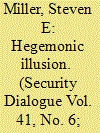

|
|
|
|
|
| Publication |
2010.
|
| Summary/Abstract |
At the heart of Buzan & Hansen's (2009) narrative is a conflict dynamic that pits traditional strategic studies, narrow and overly militarized but dominant, against a diverse set of challengers who aim to widen and deepen the field. Gradually, the challengers erode the hegemonic position of the traditionalists. This analysis reflects the assumptions, premises, and perceptions that Buzan & Hansen bring to this project as protagonists in the camp of the challengers. The present article offers a traditionalist response to this narrative, suggesting that the evolution of the field looks very different when viewed through the lens of traditional strategic studies.
|
|
|
|
|
|
|
|
|
|
|
|
|
|
|
|
| 17 |
ID:
104022
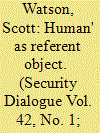

|
|
|
|
|
| Publication |
2011.
|
| Summary/Abstract |
Humanitarianism rivals security in its ability to legitimize emergency measures, and has also proven to be as ambiguous and open to abuse. In this article, humanitarianism is reconceptualized as a sector of securitization, like state and societal securitization, meaning that it is a structured field of practice that draws on existing discourses and institutions to enable the implementation of emergency measures. This reconceptualization contributes to the theory of securitization by expanding its applicability beyond states and societies to humans as referent objects, but also by challenging the Copenhagen School's conceptualization of normality/exceptionality at the domestic and international levels. Drawing on the humanitarian securitization of the 2004 Indian Ocean tsunami, the article demonstrates how the structured security field of humanitarianism privileges particular actors in speaking to human insecurity, and how the humanitarian discourse reifies and reinforces a monolithic form of human identity. The article draws attention to the process of representing developments as humanitarian emergencies and uses the framework of securitization to critically examine the discourses, practices and agents of humanitarianism.
|
|
|
|
|
|
|
|
|
|
|
|
|
|
|
|
| 18 |
ID:
191513
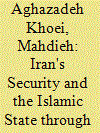

|
|
|
|
|
| Summary/Abstract |
After the Cold War, a new generation of security studies emerged that moved debates beyond traditional, narrow, state-centric definitions of security toward considering other aspects like economic, political, social, and environmental contexts. This article evaluates one such contemporary important security concern—the threat of the Islamic State (IS), mainly against Iran, in the framework of the Copenhagen School security approach. The analysis concludes that IS threatens Iran's security by increasing the possibility of Kurdish sectarianism, widening the Shi’ite–Sunni gap, creating economic threats, decreasing Iran's influence in Syria, and challenging its power in the region. Analyzing Iran's stance against IS and the ensuing security debate is important to predict the future of the Middle East.
|
|
|
|
|
|
|
|
|
|
|
|
|
|
|
|
| 19 |
ID:
113726
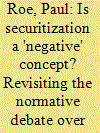

|
|
|
|
|
| Publication |
2012.
|
| Summary/Abstract |
The purpose of this article is to revisit the normatively defined debate over securitization as a negative conception. Claudia Aradau's work has largely served to define this debate, with Aradau arguing that securitization/security is an inherently negative conception inasmuch as its mode of extraordinary politics necessarily both institutionalizes fast-track decisionmaking ('process') and produces categories of enemy others ('outcome'). In making evident the main assumptions therein, my argument is that this debate has taken place not only in terms of a specific - and indeed contestable - rendering of the securitization concept, but also in terms of a more general acceptance of an essentialized (Schmittian) logic of security. The article thus seeks ultimately to demonstrate the value of de-essentializing the practices evoked by speaking security and to show how this enables meaningful engagement with other emerging conceptions of 'positive' security.
|
|
|
|
|
|
|
|
|
|
|
|
|
|
|
|
| 20 |
ID:
139412
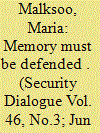

|
|
|
|
|
| Summary/Abstract |
This article supplements and extends the ontological security theory in International Relations (IR) by conceptualizing the notion of mnemonical security. It engages critically the securitization of memory as a means of making certain historical remembrances secure by delegitimizing or outright criminalizing others. The securitization of historical memory by means of law tends to reproduce a sense of insecurity among the contesters of the ‘memory’ in question. To move beyond the politics of mnemonical security, two lines of action are outlined: (i) the ‘desecuritization’ of social remembrance in order to allow for its repoliticization, and (ii) the rethinking of the self–other relations in mnemonic conflicts. A radically democratic, agonistic politics of memory is called for that would avoid the knee-jerk reactive treatment of identity, memory and history as problems of security. Rather than trying to secure the unsecurable, a genuinely agonistic mnemonic pluralism would enable different interpretations of the past to be questioned, in place of pre-defining national or regional positions on legitimate remembrance in ontological security terms.
|
|
|
|
|
|
|
|
|
|
|
|
|
|
|
|
|
|
|
|
|